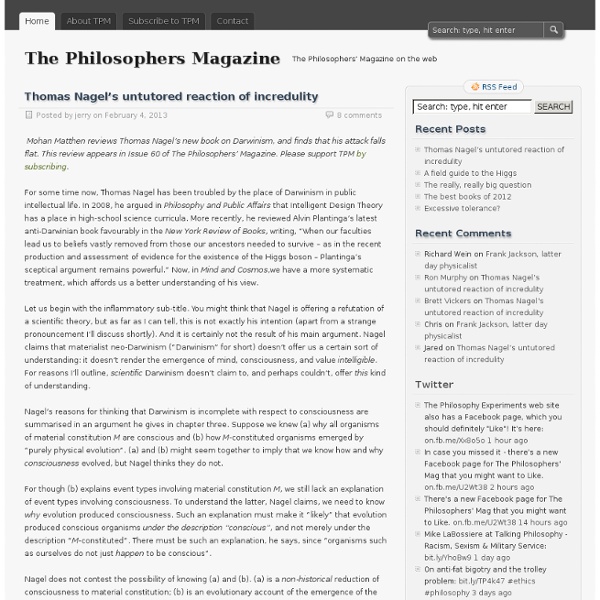



Mise en ligne du dossier 2009 | Implications philosophiques Dimanche, 18 Octobre 2009 09:36 Ce dossier inaugural organisé par le site implications-philosophiques.org a pour thème “l’habitat, un monde à l’échelle humaine”. Le choix de cette problématique vise à encourager les approches pluridisciplinaires, afin de montrer la fécondité de la convergence des regards sur un thème qui n’est réductible à aucune discipline en particulier. C’est pourquoi nous avons souhaité composer un dossier qui regroupe les approches philosophiques et littéraires, tout en donnant également la parole à des sociologues, des architectes et des urbanistes. L’habitat, ce n’est pas que des maisons, c’est aussi des hommes. Au-delà du logement se situe l’habiter. Vox Philosophiae vous recommande : - Implications philosophiques | éthique, rationalité et axiologie dans la philosophie contemporaine
Ovi Magazine : Finland's English Online Magazine the Economics of Happiness | Home Euthyphro dilemma The dilemma has had a major effect on the philosophical theism of the monotheistic religions, but in a modified form: "Is what is morally good commanded by God because it is morally good, or is it morally good because it is commanded by God?" Ever since Plato's original discussion, this question has presented a problem for some theists, though others have thought it a false dilemma, and it continues to be an object of theological and philosophical discussion today. The dilemma[edit] Socrates and Euthyphro discuss the nature of piety in Plato's Euthyphro. Euthyphro proposes (6e) that the pious (τὸ ὅσιον) is the same thing as that which is loved by the gods (τὸ θεοφιλές), but Socrates finds a problem with this proposal: the gods may disagree among themselves (7e). Euthyphro then revises his definition, so that piety is only that which is loved by all of the gods unanimously (9e). At this point the dilemma surfaces. In philosophical theism[edit] Explanation of the dilemma[edit] Problems[edit]
virtual philosopher Table of Contents - Magazine The Thirteenth Amendment forbade slavery and involuntary servitude, “except as punishment for crime whereof the party shall have been duly convicted.” Crops stretch to the horizon. Black bodies pepper the landscape, hunched over as they work the fields. To the untrained eye, the scenes in Angola for Life: Rehabilitation and Reform Inside the Louisiana State Penitentiary, an Atlantic documentary filmed on an old Southern slave-plantation-turned-prison, could have been shot 150 years ago. The film tells two overlapping stories: One is of accomplishment against incredible odds, of a man who stepped into the most violent maximum-security prison in the nation and gave the men there—discarded and damned—what society didn’t: hope, education, and a moral compass.
The world's leading monthly magazine for advertising, design and visual culture - CreativeReview - A responsive Shopify theme 6 thinkers whose depressing ideas will make you feel better We are absurdly anxious about success, says popular philosopher Alain de Botton (TED Talk: Alain de Botton: A kinder, gentler philosophy of success). In his talk from 2009, he suggests that many of our modern values — like our sense of limitless possibility and upward growth — can actually lead us to stress harder about how well we’re doing. But the reverse can also be true, says de Botton. For TED, he’s put together this reading list of (mainly) pessimistic philosophers who have inspired his thinking about positivity. 1. “Montaigne likes to point out that philosophers don’t know everything, and that they would be a lot wiser if they laughed at themselves a little more. 2. “Seneca belonged to the Stoic school of philosophy, which is all about teaching you how to respond calmly to disaster. 3. “Schopenhauer is another great pessimist who makes you feel happier. 4. “A much-misunderstood philosopher, seen as barking mad but actually very wise and sane. 5. 6.
Chomsky superstar à Paris, aussi attendu que le dalaï lama Salle comble et ambiance survoltée à La Mutualité, où l’intellectuel américain, âgé de 81 ans, a échangé avec son public français. Noam Chomsky à La Mutualité samedi (François Krug/Rue89) Un linguiste de 81 ans accueilli en vedette, et pas seulement par les scientifiques : de passage à Paris, Noam Chomsky a pu mesurer son aura dans la gauche radicale française. Entre crise financière et enlisement américain en Irak, sa critique de tous les pouvoirs porte désormais au-delà du cercle des convaincus. Les 1 600 billets pour sa conférence de samedi à La Mutualité, vendus 18 euros, sont partis rapidement. A la tribune, Daniel Mermet, animateur de l’émission Là-bas si j’y suis sur France Inter, jubile : « Seuls le dalaï lama et Soeur Emmanuelle ont fait mieux. » Lorsque Noam Chomsky apparaît enfin, les spectateurs les plus jeunes l’accueillent avec des cris dignes d’un concert de rock. Un appel à une contestation non-violente Israël n’a pas autorisé Chomsky à se rendre en Cisjordanie
Homepage Publications | Research Libraries UK Earlier reports April 2011 RLUK Library Trends report Heading for the open road: costs and benefits of transitions in scholarly communications March 2011 Student satisfaction and library provision The value of libraries for research and researchers Top image courtesy of University of Bristol Library, Special Collections Latest News / View all News According to there are only 5 Little Free Libraries in the whole of the UK! 7h ago untitled